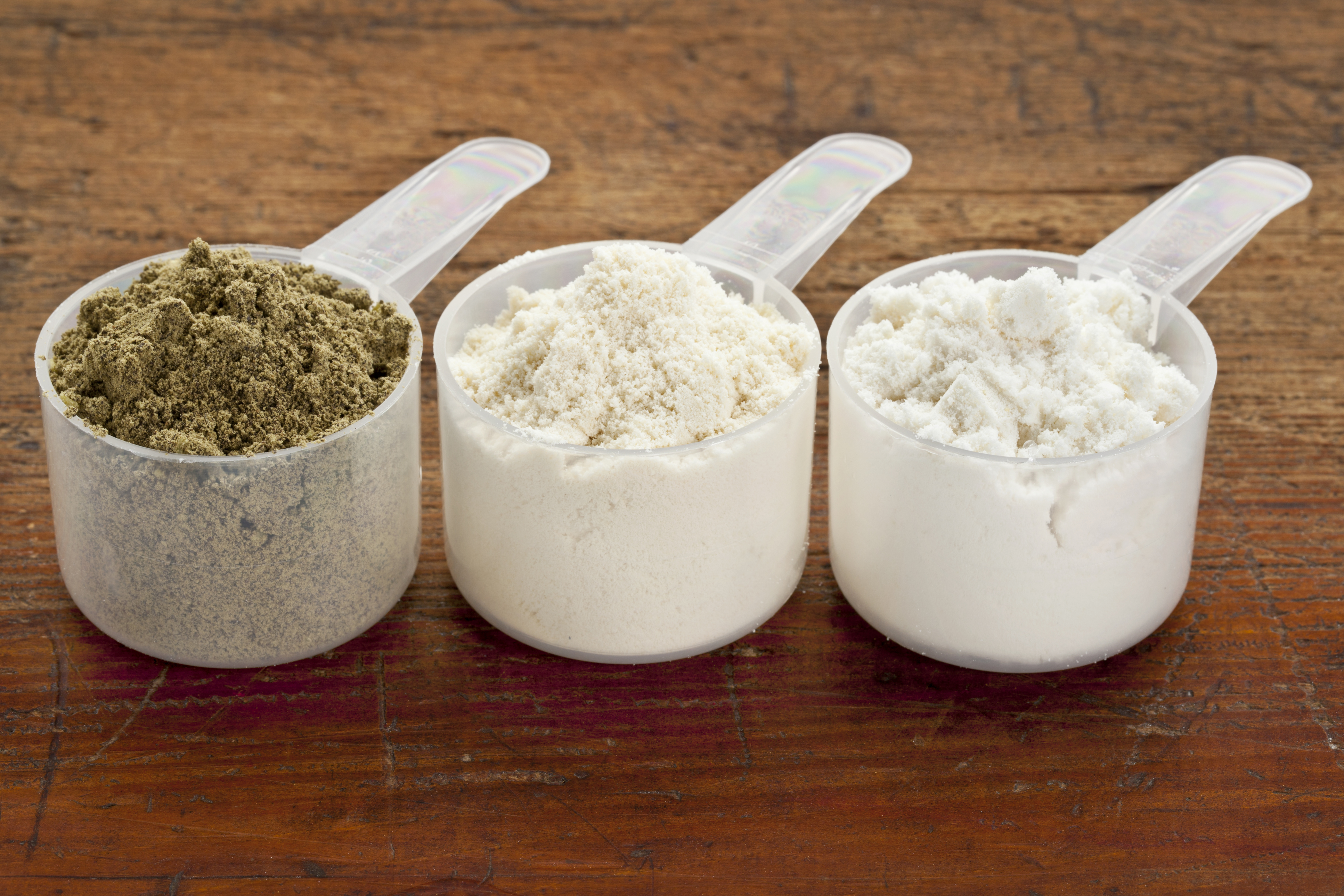Debbie J., MS, RD contributed this article –
If you’ve passed by the shelves of protein supplements, and were overwhelmed by dozens of containers spouting terms like isolates, hydrolyzed, microfiltered and fractionated, then read and learn!
[First, a little history… Forty years ago there was really just one protein made into a powder form – egg. Then along came products with concentrated soy and textured vegetable proteins. Finally milk proteins made their way to the stage as specialized nutrition supplement stores boomed. By 1990, milk & egg protein powders could be found in the general grocery store and supermarket (gasp!) These were generally whole protein supplements. Now, protein has been extracted from nearly every plant source imaginable, and made into vegan supplement options, while protein itself has been broken down into its very core, amino acids.]
This page will help you sort through the myriad of straight protein choices* so you can pick the one right for you. Before you find a protein powder that suits your needs, you first need to identify the reason why you want (or think you need) a protein supplement beyond whole food sources.
Below are some of the most common statements people make as their reason for using protein supplements. Each is followed by a suitable protein supplement recommendation for that particular motivation.
“I DON’T COOK”
Egg protein/Albumin: highly digestible (bioavailable) protein from egg whites. It provides all necessary (essential) amino acids, digests moderately fast, and contains no lactose, fat or cholesterol. Practically flavorless, it’s easy to incorporate into foods as a little protein boost. Just mix a spoonful into semi-moist dishes like soups, oatmeal, creamy pasta or pudding.
“I DON’T EAT MEAT.”
Casein: major milk protein that digests at slow speed, providing a steady supply of amino acids. Decreases protein breakdown. It is available in 3 main forms:
- Caseinate – Bonded to calcium, sodium or potassium. Mixes easily in fluids.
- Micellar casein – Spherical particles that form when microfiltration is used to separate the casein from the rest of the milk. Very slow digesting process.
- Hydrolyzed casein protein –Shorter chains resulting from water breaking the bonds between amino acids. Moderately fast digesting.
Soy: concentrates are about 70% protein while isolates are more than 90% protein.Carbohydrates make up the remainder. Digests moderately fast. Rich in glutamine and arginine. Does contain phytoestrogens. The characteristic texture and taste of soy powder is masked well in prepared dishes and smoothies.
“I WORK OUT.”
Whey: from the fluid part of milk, containing about 6 different proteins. Whey protein isolate is an aggregation of these proteins that are captured after lactose, fat and minerals are removed. Fractionated whey protein has further separated these into purified fractions. Microfiltration further purifies the powder into very high protein concentration (>90%). This protein digests quickly, increases protein synthesis, which promotes the growth of lean tissue mass, while facilitating muscle repair and rebuilding.
“I WANT TO LOSE WEIGHT.”
Hemp: straight hemppowder is about 50% protein, whereas concentrates are about 70% protein. Also, it contains fiber, minerals and healthy omega fats.It is rich in branched chain amino acids (BCAAs) and arginine. Best mixed into smoothies as a meal replacement.
“I’M ALLERGIC TO…EGGS, MILK, SOY and GLUTEN.”
Brown Rice: gluten-free vegan source. Hypo-allergenic and easily digested. As with most plant proteins, it doesn’t contain all essential amino acids. Combine it with pea powder to make a complete protein.
Pea: gluten-free vegan source. Hypo-allergenic and highly digestible. Doesn’t contain all essential amino acids, but is high in lysine, arginine and glutamic acid, as well as BCAAs. Combine with brown rice powder to make a complete protein.
With so many options, there is certainly a protein powder for everyone! While some powders run 90 cents per serving, those of you on a budget can find protein powder for as little as 35 cents per serving, if you buy in bulk (2-5 lbs). Remember, they are all processed and should only be used as a supplement to whole foods, not as a replacement for chicken, eggs, fish, beef, beans and dairy.
* Supplement formulas (protein in combination with functional ingredients as ‘proprietary’ blends) sold as ergogenic aids used for athletic performance are another topic. Watch for a future article!


I have diabetes, trying to loose weight and tone up, is any of these proteins good for me?
Yes, Juan. Assuming you’d be consuming a protein powder in milk or with a meal, you may benefit from the hemp powder; its fiber helps food digest more slowly, stabilizing blood sugar. If you’re going to have straight protein in water on an empty stomach, then it’s really your choice as long as the product doesn’t have significant added sugars (>6 grams per serving).